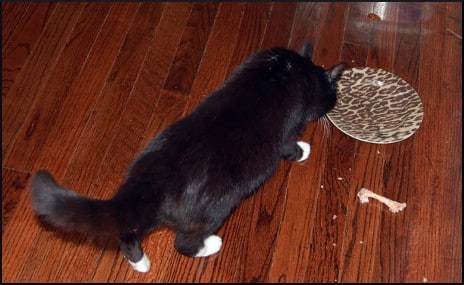The day that follows a big holiday blowout is perfect for good intentions, and most of us formulate resolutions with ease. We decide to take the high road, to do everything right from here on out. But how?
The advice for the day after Thanksgiving is the same as for any other day of the year. There are some obvious issues that we already know even if we pretend ignorance. For instance, cut out the fizzy beverages, and take a close look at whatever energy drinks and fruit juices your child may be consuming. Another major precept is “Lead by example.” The maintenance of a healthy normal weight also depends on numerous small decisions and habits, many of which are just common sense. Parents can find a generous array of tips. Here is one from registered dietician Maryann Jacobsen:
Be smart about sweets: When parents reward kids with sweets, take them away for punishment, provide them to make kids feel better or overly restrict or provide too much access them, they make these foods even more desirable to kids. Instead, parents can serve them in a frequency that makes sense for their family, utilize structure and teach kids how to sensibly fit these foods fit into a balanced diet.
Think outside the box – the one on cables that goes up and down. If there is a choice between an elevator or stairs, take the stairs – within reason, of course. (That is where the common sense part comes in.) Taking a child to a 10th floor doctor’s office, ride on up. But after the appointment, why not walk down the stairs? It counts as exercise, it burns up calories and gives a workout to muscles that are not much used.
Create an Adventure
Make it interesting. Voices sound different in stairwells, and so does tapping a pen on a railing. If you don’t want to hear a bunch of yodeling, suggest whispering all the way down. You could count the steps; or count the steps in one flight and count the flights, and teach an impromptu multiplication lesson. If your child is unfamiliar with the word “descend,” it’s also an English lesson.
How many different ways can your child describe the activity of walking downstairs? Who might have a really hard time walking downstairs? A person with a broken leg? A baby? A grandma or grandpa? Someone with no shoes? A very overweight person?
It could be a fascinating discussion and an opportunity to develop some real empathy. In general, children learn through their bodies and need sensory experiences to match up with things they see. For a child who has experienced a long descent on foot, a movie in which the heroine flees down steps hewn from stone, or a hero runs down the stairs of a lighthouse, will have an extra dimension. For a parent, it is possible to turn a chore into an adventure, and an opportunity for exercise. What’s not to like?
Your responses and feedback are welcome!
Source: “15 of the All-Time Best Strategies for Raising Healthy Eaters,” RaiseHealthyEaters.com, 02/07/14
Image by Ilovebutter


 FAQs and Media Requests:
FAQs and Media Requests: 











